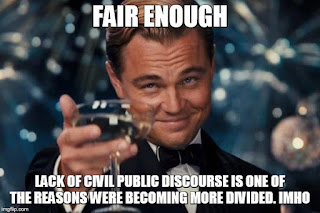The Devil has a Silver Tongue: cult leaders' skilled oral discourse as illustrated by American Horror Story
How ever could the devil triumph over a person whose language is so powerful? Through his “clearness and downright simplicity of statement, his vast comprehensiveness of topics, his fertility in illustrations drawn from practical sources; his keen analysis, and suggestions of difficulties; his power in disentangling a complicated proposition, and resolving it in elements so plain as to reach the most common minds; his vigor in generalizations, planting his own arguments behind the whole battery of his opponents; his wariness and caution not to betray himself by heat into untenable positions, or to spread his forces over useless ground”, he is unconquerable by evil (Postman, 58).
But the devil can triumph over such individuals. Many cult leaders possess harrowing, enticing aptitude for oral discourse in order to attract followers to their cause. Oral discourse is more likely to become tainted, and more likely to entice audiences without question, because it doesn't allow the audience time to mull ideas over or look up "how true" they are. Its powerful plays on emotion build a sense of community amongst a group of people who are physically close and visible to one another (during gatherings), which print text cannot do. Oral discourse's unique tactics make cult members want to believe their leaders.
Cult leaders play on the human tendency to classify everything into groups; situating "us" against a generalized other to build a sense of community and trust. Lately, this other has taken the form of nonwhite nonmales, as American Horror Story's "Cult" (a season based on the 2016 Presidential Election) plays upon. Politician-to-be Kai Anderson travels door-to-door claiming, "you are 40% more likely to be the victim of a violent crime committed at the hands of an illegal immigrant, and that the murder and rape rates are the highest they've ever been?" (1:48- 2:07). When asked where this information came from, Anderson literally cites Facebook. For real. (This is in refence to Donald Trump's parallel claims in the 2016 election).
Today, leaders and figureheads in power often can say almost anything without being questioned by the public, who aren't as readily involved in politics and social issues as we were in the age of print, so their information appears realistic enough that the public believes it without questioning. Because any information is available, with varying degrees of truth to it, we all have the ability to nitpick out information that supports out point of view, and with enough charisma, others will believe it too. Facts are subordinate to their point of view (Postman).
Cult leaders are also hypersensitive to how they're perceived by others, which is what shapes their dialect into something cunning, sly, and persuasive. Oral discourse is heavily reliant on nonverbal additions such as tone or gestures, which are not found in print discourse (unless it's written like a cringey fan fic, *blushes, shakes head in embarrassment*). Kai rallies his followers through ascension of volume, overemphasized inflection, forced pauses, and, of course, referencing the collective "us", as opposed to "you". (Internalized reliance on community is a staple of cults).
When he forces the group to take a lead of faith with poison-laced Kool-Aide (the Jonestown massacre) Anderson shouts, "DO YOU FEEL IT?" to engage his audience, who scream their affirmation. He reveals, "There was NOTHING in the Kool-Aide! Nothing except the proof that we are in this together!" (Unfortunately, I cannot find this clip without copyright, but hopefully this gif can communicate his animosity).
This powerful experience allows Anderson's audience to engage directly and physically with his discourse in a way that the written word cannot. Cult leaders use danger & risk and call-and-response tactics in their oral discourse to engage their audience on a level higher than what print discourse can do. Modern oral discourse needs to involve the audience directly in order to be effective, as our attention spans are infinitesimally short and because we possess far less context than participants in a print-based society.
Although this is a very obvious example of cultic leadership and discourse (the season is called "Cult", for cryin' out loud), these types of leaders are everywhere in society. Interestingly enough, a certain orange man's behaviors follow the principles of cultic behavior and engagement, and he gained millions of "believers"... So, what can we do to save ourselves from manipulation by devils cloaked in graceful, skilled discourse?
We can stay informed from all angles; we can question everything. Semper Curiosus, my friends. Stay Curious.




Excuse me while I take some of your words out of their context.
ReplyDelete“[. . .]members want to believe their leaders.”
“[. . .]situating "us" against a generalized other to build a sense of community and trust.”
“[. . .]ascension of volume, overemphasized inflection, forced pauses, and, of course, referencing the collective ‘us’, as opposed to ‘you’.”
“[. . .]danger & risk and call-and-response tactics in their oral discourse to engage their audience on a level higher.”
So. . . I'm not saying it sounds like you’re talking about every organized religion in the history of western civilization. But, it sounds like you’re talking about every religion in the history of the west. Not that I'm criticizing mind you, it's a notion I'm inclined to agree with
Where am I going with this? . . Perhaps, if we are to rid ourselves of the influence of those who use these tactics, we need to rid ourselves of ALL of them. Even the ones we may describe as “good” or “helpful”.
Perhaps manipulative discourse is a power that is incapable of being used for good? Ring of Sauron style.
Perhaps my disdain for organized religion as a concept is clouding my judgement and I’ve no idea what I'm on about. Who knows?
Ahhh yes, one of my favorite, if admittedly morbid, subjects to talk about: cults! I've never watched AHS before (I tried once but it was the episode with crab claws doing some nasty stuff, so I never went back), but this clip and your description of Anderson have piqued my interest. I think that it's interesting to compare religious cults to political/social followings--too much faith/focus on anything can have disastrous effects. Cults often form under the guise of religion because charismatic leaders are able to use narratives about death and eternal punishment to scare followers into doing their bidding, but political leaders can produce the same outcome by using similar scare tactics. Using Trump as an example, his whole campaign appeals to the fears of White Christian America--when he was trying to get reelected, the ads he aired and emails he sent out used very fear-inducing language that posited a heavy "us vs. them" mentality. I wonder if, years from now, super Trump supporters will look back on this time and be able to recognize how they were manipulated as easily as outsiders looking in can recognize it.
ReplyDelete